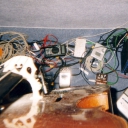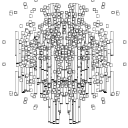Group Objects
The patcherize plugin is wonderfully useful... But there is a huge bug: any message or GUI need to be cut-pasted again before clicking on any of them otherwise ALL SYSTEM CRASH INSTANTLY.
So during a workshop with students, its is so dangerous, I had to remove it ;/
Another simple pd issue that would be nice to have fixed 10 years ago.
Fast Prototyping for Ofelia
I have updated many abstractions, and changed a bit the way some works...
It was ok for my last workshop, but still thinking about a way to make it better.
Pd for Windows with Jack support ?
Thank you for your replies.
@whale-av I wanted to use Jack to connect Pd (and VCV Rack) with Jamulus software for an online workshop. I thought that Jack would be a cross-platform solution (some students use Windows, others use OS-X) but it is not the case. I'll check vb-audio.com but I think I will give a try to puredata aoo (audio over osc) external .
running pd on website?
I never tried it myself yet, but the author told me that Webpd is focused on efficiency. He is still working in it and will soon lead a workshop with us in fine Art school of Paris. So I might be able to give you some news soon.
International Faust Conference (IFC-20)
This is not directly related to Pd but you might be interested in this conference because you can run Faust code inside Pd and you can generate Pd externals using Faust. Moreover, Faust is open-source and the conference is free and available to everyone 🙂
The Second International Faust Conference (IFC-20) will take place by teleconferencing on December 1-2, 2020. It aims at gathering researchers, developers, musicians, computer artists using the Faust programming language to present current works, creations and projects and discuss future directions for Faust and its community. The 2020 edition is organized by the CICM (Centre de Recherches Informatique et Création Musicale) / the MUSIDANSE Lab / the Université Paris 8.
In 2020, we will put a special focus on artistic, pedagogical, preservation and student projects made with Faust, as well as on the use of this language in mixed music on the Seine Saint-Denis territory. A workshop will bring together young musicians from Saint-Denis Conservatory with their professors, and students from the Music Department of Paris 8 University programming in Faust.
The conference will propose sessions of paper presentations, as well as thematic round tables, demonstrations and tutorials, and artistic events with a concert of music pieces and the exhibition of installations using Faust.
Details and presentation: https://ifc20.sciencesconf.org/
See the call for papers, workshops and creations
Practical information
The conference and all its events will take place remotely and are free.
The registration is mandatory on the conference website:
https://ifc20.sciencesconf.org/registration
The conference is supported by the AFIM (Association francophone d'Informatique Musicale, through the call for projects of the DGCA of the French Ministry for Culture and Communication) and the Maison des Sciences de l'Homme Paris Nord (through the 2020 call for projects).
Using PD in a complex commercial hardware groovebox project
@ingox @old Good to see you both on this.
I agree.
I think the Organelle, although @EEight found it expensive in 2015 is about as far as anyone can go with a small workshop production, and obviously returns a profit (with manufacture probably in the US..... Pennsylvania?).
I would still go the Pd + touch route first and tack the hardware on later when it is a developed product..... mistakes predicting customer needs will be costly..
If it costs them $100 to produce (I would expect more) then I suppose that they could be built to order at first but the tooling and first workshop run would probably need to be say 200 units. So $20,000+ for the first run and I would want to know that I could sell most of them quickly.
All speculation of course.
Fast Prototyping for Ofelia
Hi @ddw_music,
I did not have time to finish it in a "satisfaying usable state" for my last workshop unfortunately. Making such an exhaustive library pretending replacing Gem from scratch is not an easy task.
Also since then Ofelia v4.0 was released and Zack Lee did what it should to make ofelia a better and cleaner lib: remove all openframeworks pd's objects and keep only one [ofelia] main object as function call.
This make this "Fast Prototyping Ofelia" project even more useful for workshop, since with current ofelia v4.0, students really need to know lua to be able to draw anything on screen!
But I made many improvement on the project recently and totally re-designed a lot of stuffs, specially for the coordinate part because historically Openframeworks used a pixel based coordinate system (point 0,0 is top left of the screen) and we need to have a true normalized one (like Gem where 0,0,0 is at center). So the solution was to create a default camera along with the window context rather than rendering things at the center of the screen). Also I discovered the reversed openGl coordinate for texture etc that need a bit of time to be fixed before going further.
So expect a test update very soon, so I might be ready for my next workshop beginning of december, if the Coronavirus Lockdown in France will finish :/
HRTF data convolution with FFT
@Laevatein do you want to avoid externals in general?
my spoonful of wisdom if you want to do something like earplug~ with pd-vanilla objects only:
First you'll have to figure out how to do the panning between your channels. basically you have two options, vbap (vector based amplitude panning, read: https://ccrma.stanford.edu/workshops/gaffta2010/spatialsound/topics/amplitude_panning/materials/vbap.pdf) or dbap (distance based amplitude panning, read http://www.pnek.org/wp-content/uploads/2010/04/icmc2009-dbap.pdf).
Actually it's just triangulation, not too complicated stuff. You'll find many open source code examples online, including pd-patches, e.g. [pan8~] in the else library or my humble implementation [pp.spat8~] in audiolab are dbap. Both are available in the deken repos (help -> find externals)
The convolution part is a bit more complicated. You can do it in pd-vanilla, there are some examples in Alexandre Torres Porres live electronics tutorial, which is now part of the else library i think. But if you care about latency or if your IR files are larger than a few hundred milliseconds you'll have to use partitioning. Again, you can find examples online. Tom Erbe shared something a few years ago, there are patches in else, in audiolab ... Problem is though if you're doing the convolution part in pure data and you'll need to convolve with say 8-16 stereo impulse responses to get a decent binaural effect... it will bring your modern day computer to it's knees. You can try to outsource the convolution part to different instances of pd with [pd~] but I think it makes much more sense to do it with tools that are better suited for this task. jconvolver comes to mind if you're using jack.
good luck with your project!
(edit: grammar)
Fast Prototyping for Ofelia
Hi everyone,
Gem was a perfect tool for small workshops: easy to understand for a beginner and fun.
It's now very outdated and have many consistencies problems on various plateforms (fullscreen, key codes pb, camera, media etc...).
So I need a good visual tool for my next pd workshop and Ofelia is the perfect library... but it's also a bit difficult for beginners because :
- Too many objects for fast prototyping
- Sometimes long object names with uppercases etc
- help files lead to OpenFrameworks documentation
So I made a few abstractions in order to think of a kind of "Gem" replacement.
Main ideas are:
- Modular single blocs primitives like Gem, with many methods and arguments + their help file.
- Allows to draw and see something on screen even with unfilled arguments (and expandable default arguments)
- Remove all dependencies but Ofelia (no need for more dependencies with this lib)
Here is a first test... I am learning Lua at the same time so it's a bit experimental.
Somebody have good hints to share? Best lua / Openframeworks practise?
https://github.com/60-hz/Ofelia-Fast-Prototyping
(of course the only lib needed is Ofelia)
Cheers!
Workshops
Check on the Pure Data Facebook group, and on the PD mailing list, as there are more likely to be announcements there. You do find workshops sometimes, but you'd be lucky to find one at the right place and right time.
But don't be discouraged from learning PD if you can't find a workshop. There are lots of good resources available online, and lots of friendly people willing to help. I remember thinking that I wouldn't be able to learn it without a teacher, but once I pushed through the initial hurdles, teaching myself became easy and enjoyable.





